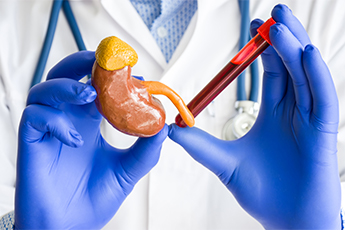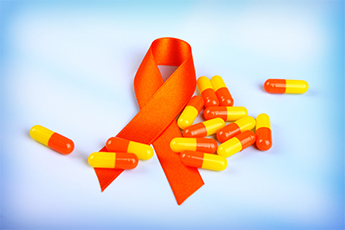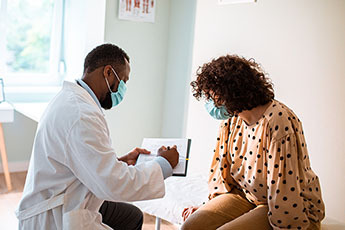4 warning signs of kidney cancer

Your kidneys play a critical role in helping your body filter blood and remove waste. When kidneys are healthy, you probably don’t think much about them. But sometimes masses or tumors form in the kidneys, causing problems or diseases.

What is kidney cancer?
It’s estimated that 1 in 4 kidney tumors are not cancerous (benign). Larger tumors are more likely to indicate kidney cancer. Nearly 74,000 Americans will find out they have kidney cancer this year. This disease mostly affects adults, but children get kidney cancer, too. Certain risk factors, such as smoking, a family history of kidney cancer, and obesity, make you more likely to get kidney cancer.
The disease doesn’t always cause symptoms. That’s why it’s important to be in tune with your body. You may be able to detect slight changes that indicate a problem when the cancer is still in the early stage and hasn’t spread (metastatic kidney cancer). Early disease detection can lead to a better prognosis.
From the community: “A lot of times there aren't any [symptoms]. Rarely there is blood in the urine or pain. Usually it is found by accident when looking for something else. Rather silent until it has metasticised to other areas. Mine was discovered when lung mets caused pleural effusion and I got very short of breath. Good luck.” – Inspire member
What are the early warning signs of kidney cancer?
You should contact your doctor if you experience symptoms that seem different or something just feels wrong. Making that phone call to your doctor is especially important if symptoms last for several weeks.
Here are 4 of the most common warning signs of kidney cancer:
blood in the urine
extreme fatigue
side, back, or stomach pain
unexplained weight loss
Blood in the urine
The medical term for blood in the urine is hematuria. About half of people with renal cell carcinoma have this symptom. An estimated 9 out of 10 adults with kidney cancer have RCC, making it the most common type of kidney cancer in adults.
You may notice blood in the toilet bowl, or your urine stream may look pink, red, or tea-colored. This symptom may come and go. On days when your urine looks normal, it may be tempting to dismiss the other times when the urine color seemed off. You should contact your doctor any time you notice changes in urine or urination.
These changes include urine that looks bloody or cloudy, foul-smelling urine, and a frequent need to urinate. You could have a urinary tract infection (UTI), a bladder infection, or a kidney stone. Or it could be a sign you have kidney cancer.
To determine the cause, your doctor will perform a urinalysis. This test checks for blood and other substances. A urinalysis can detect minuscule amounts of blood not visible to the naked eye.
Extreme fatigue
Many people with kidney cancer have low levels of red blood cells. This condition is called anemia. Red blood cells carry oxygen and remove carbon dioxide. It makes you feel tired because your body has too much carbon dioxide and not enough oxygen.
In addition to fatigue, anemia also causes:
chest pain
dizziness
pale skin
rapid heart rate or breathing
shortness of breath
swelling in hands or feet
A few other reasons you might be exhausted: Cancer cells tap into your body’s energy reserves to help them multiply. Some of that stolen energy comes from the foods you eat. If you’re eating less due to losing your appetite, you’ll have less energy overall.
Your body is also trying to fight these cancer cells. This battle requires a lot of energy. You may find yourself wiped out after very little activity. Even after a good night’s rest, you may still feel like you need more sleep. Extreme fatigue of any type is usually an indication that something isn’t right.
Side, back, or stomach pain
Your kidneys sit midway down your back underneath the rib cage. Small kidney cancer tumors may not cause pain, but larger ones can press on the kidneys and surrounding organs.
You may feel flank pain. This pain affects the side of the body with the diseased kidney. Pain may radiate down the side between the upper abdomen and back. This area is also known as the lumbar region. You may also just have back pain, or less commonly, stomach pain. Rarely, you may feel a lump or mass in the tender area.
This pain may be sharp and come and go. Or you might feel a constant dull ache. Back pain is a common issue as you get older: most of the time, other problems such as a slipped disk, a pulled muscle, arthritis, or even kidney stones are the cause of back or flank pain — not cancer. You should see your doctor if the pain lingers for more than a few days and affects your ability to do things.
From the community: “My Dr ordered an ultrasound because I thought I was having gallbladder pain also. I remember saying I could feel a fullness under my right rib that on my skinny days I could push on and feel it move back under my rib. I had a tiny tumor and my dr said we were lucky to find it because most kidney cancers were found on accident. Mine was caught because I had a cyst so they ordered a cat scan which lead to a 3 phase cat scan. They told me I was lucky mine hurt and we were able to catch it early probably due to pain from the cyst not the chromophobe cancer.” – Inspire member
Unexplained weight loss
Approximately 1 in 3 people with kidney cancer lose their appetites. Eating less leads to fewer calories going in and more pounds coming off. Sometimes, cancer cells use calories from food to fuel their own growth, depriving your body of the calories it needs to maintain a healthy weight. If you’re dropping pounds without intending to, see your doctor.
How do I know if I have kidney cancer?
Your doctor will perform different tests to diagnose kidney cancer. Some people learn they have kidney cancer after a routine urine test detects a problem. If you’re having symptoms, an imaging test such as a CT scan or MRI may show a mass.
What are the next steps if I have kidney cancer?
The top treatment for kidney cancer is surgery to remove the cancerous tumor (partial nephrectomy) or the entire kidney (radical nephrectomy). You may also receive radiation therapy and other treatments.
What’s the outlook if I have kidney cancer?
Overall, about 3 out of 4 people with kidney cancer are still alive five years after diagnosis. The earlier the cancer is detected, the better the prognosis.
From the community: “Despite the 13 years since the diagnosis, I can still get scared that the cancer has returned. For example, one of my symptoms that was not considered important was unexplained loss of weight. My ex-doctor attributed that and a few other choice things to my being a stressed-out housewife. When I got well, I unintentionally gained the weight back and then some, thinking in my pea brain that an extra layer of fat would make it harder for me to waste away, as had been happening. It took a long time to be comfortable (and happy!) about the loss of a few pounds...” - Inspire member
Sources
Key Statistics About Kidney Cancer. American Cancer Society. February 2020.
Kidney Cancer Signs and Symptoms. American Cancer Society. February 2020.
Low Red Blood Cell Counts (Anemia). American Cancer Society. February 2020.
Risk Factors for Kidney Cancer. American Cancer Society. February 2020.
Signs and Symptoms of Cancer. American Cancer Society. August 2014.
Survival Rates for Kidney Cancer. American Cancer Society. February 2020.
Tests for Kidney Cancer. American Cancer Society. February 2020.
Kidney Cancer: Symptoms and Signs. American Society of Clinical Oncology. August 2019.
Gale Harding G, et al. Symptom Burden Among Patients With Renal Cell Carcinoma (RCC): Content for a Symptom Index. Health and Quality of Life Outcomes. June 2007.
What Is Kidney Cancer? Urology Care Foundation.
Disclaimer
Member comments are lightly edited for length and to remove identifying information but are otherwise reproduced as they appear in the community as part of public posts.
This content is for general informational purposes only and does not necessarily reflect the views and opinions of any organization or individual. The content should not be used as a substitute for professional medical advice, diagnosis, or treatment. Please consult your healthcare provider about any questions you may have regarding a medical condition.




